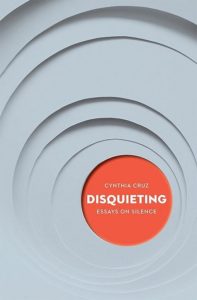
Disquieting: Essays on Silence
Cynthia Cruz, 184 pgs, Book*hug, bookhugpress.ca, $20
Brooklyn-based poet and essayist Cynthia Cruz unpacks the inarticulable in her latest collection.Weaving together personal narrative, theory, philosophy and art, Disquieting features eight fiercely vulnerable and profoundly relatable essays.
Cruz’ writing echoes that of mad studies scholars in her critique of fixed narratives, instead emphasizing individual lived experience, complexity, and ambiguity. She asks, “what would it mean to understand a symptom, not as pathology, but as a marker of emotional experience we have repressed?”
As an allusion to the idea that art enables one to say the unsayable, Cruz writes, “I want to point out the importance of the tactile, of using the hand, of cutting and pasting, of placing one object next to another — and of how by using the hands in this way, and by extension the body, you can, in a small way, somatically work through the clutter, the overwhelm, that occurs inside the mind and body as a result of trauma.” As someone who makes perzines as a means of unpacking past experiences, I strongly identify with this.
Cruz writes, “I believe there will always be a remnant that remains unsayable in our shared language” and I couldn’t agree more. Still, her collection of essays manages to say quite a lot about the relationship between trauma, silence, and the body; about the“language of psychiatry,” neoliberalism, and class; about alternative, embodied language; and about the ways all of these things interact.
